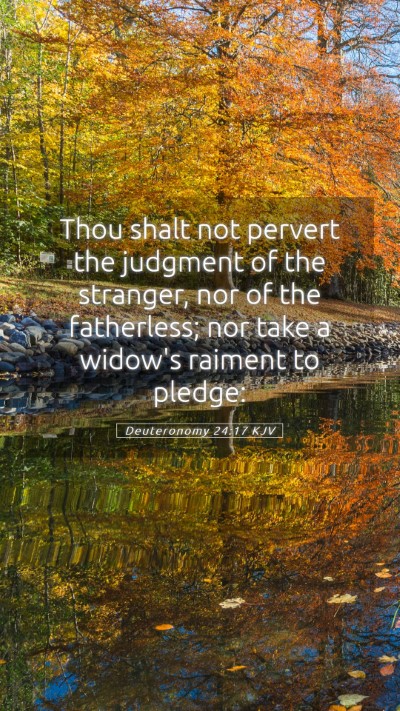Understanding Deuteronomy 24:17
Verse: "Thou shalt not pervert the judgment of the stranger, nor of the fatherless; nor take a widow's raiment to pledge."
Overview and Context
Deuteronomy 24:17 is a verse that underscores God's commitment to justice and the protection of the vulnerable members of society. This segment of Scripture is part of Moses' address to the Israelites, where he outlines various laws and ethical principles that are intended to govern their behavior as they enter the Promised Land. Understanding the Scripture not only requires careful scripture analysis but also an appreciation of the historical context of the times.
Meaning of Bible Verse
The verse can be broken down into several key insights:
- Justice and Fairness: God commands the Israelites not to twist justice in favor of the powerful or influential. They must ensure fairness toward those who are vulnerable, such as strangers (foreigners) and orphans.
- Protection of the Vulnerable: This command highlights a societal obligation to protect the rights of those who may be easily exploited, including widows, orphans, and foreigners. These groups often had limited means of support, making them susceptible to injustice.
- Property Rights: The prohibition against taking a widow's garments as a pledge emphasizes the need for sensitivity towards the plight of the widowed. In a culture where losing a husband often left a woman in grave financial straits, it would be morally wrong to exacerbate her hardship for personal gain.
Biblical Exegesis
The verse reflects broader biblical themes regarding care for the impoverished and marginalized. Notably, it sets out ethical standards expected of God's people, pushing them towards compassion and integrity. Here are some interpretations from various public domain commentaries:
Matthew Henry’s Commentary
Matthew Henry expounds upon this verse by pointing out the distinction between the powerful and the powerless in society. He emphasizes the importance of not taking advantage of the weak, reminding readers that justice is a fundamental principle that should govern human relations. He highlights that the Lord is especially concerned with the cause of the innocent and defenseless, urging the faithful to uphold these standards.
Albert Barnes’ Notes on the Bible
Albert Barnes discusses the implications of this law, suggesting that it was designed to raise the moral standard of the Israelites. He draws attention to the fact that taking collateral from a widow would not only harm her but would also provoke divine disfavor. He stresses that God sees the actions done in secret, and thus His followers must conduct themselves with a sense of accountability to Him.
Adam Clarke’s Commentary
Adam Clarke offers a detailed examination of the legal and ethical background of the passage. He notes that the importance of protecting the fatherless and the widow is echoed throughout the Scriptures, reinforcing the idea that God’s people are to mirror His justice and mercy. Clarke also elaborates on the communal responsibility of ensuring that vulnerable individuals are not mistreated, reflecting the heart of God's law.
Application of Deuteronomy 24:17
This verse is not merely a historical artifact; rather, it serves as a moral compass for modern believers.
- Ethical Living: Christians are challenged to live out these principles by advocating for justice in their communities. This can involve speaking up for those who are marginalized and ensuring that the needs of the vulnerable are met.
- Practical Compassion: Individuals can consider how their actions may affect others, particularly those in difficult situations. Whether in business dealings or personal interactions, a commitment to justice can manifest in everyday choices.
- Community Engagement: Engaging in or supporting ministries that focus on helping widows, orphans, and refugees aligns with the spirit of this verse and demonstrates practical applications of its teachings.
Cross References
In understanding Deuteronomy 24:17, the following related Scriptures may provide additional insight:
- Exodus 22:22-24: "Ye shall not afflict any widow, or fatherless child."
- James 1:27: "Pure religion and undefiled before God and the Father is this, To visit the fatherless and widows in their affliction."
- Psalms 146:9: "The Lord preserveth the strangers; he relieveth the fatherless and widow."
Conclusion
In summarizing the meaning of Deuteronomy 24:17, it is clear that the verse carries significant weight in the biblical narrative regarding justice and societal responsibility. Understanding Scripture in this light aids in grasping the intention behind God’s laws and encourages believers to practice kindness and equity in all interactions. By exploring Bible verse meanings and interpretations, followers of Christ can deepen their understanding and enhance their application of biblical principles in everyday life.


